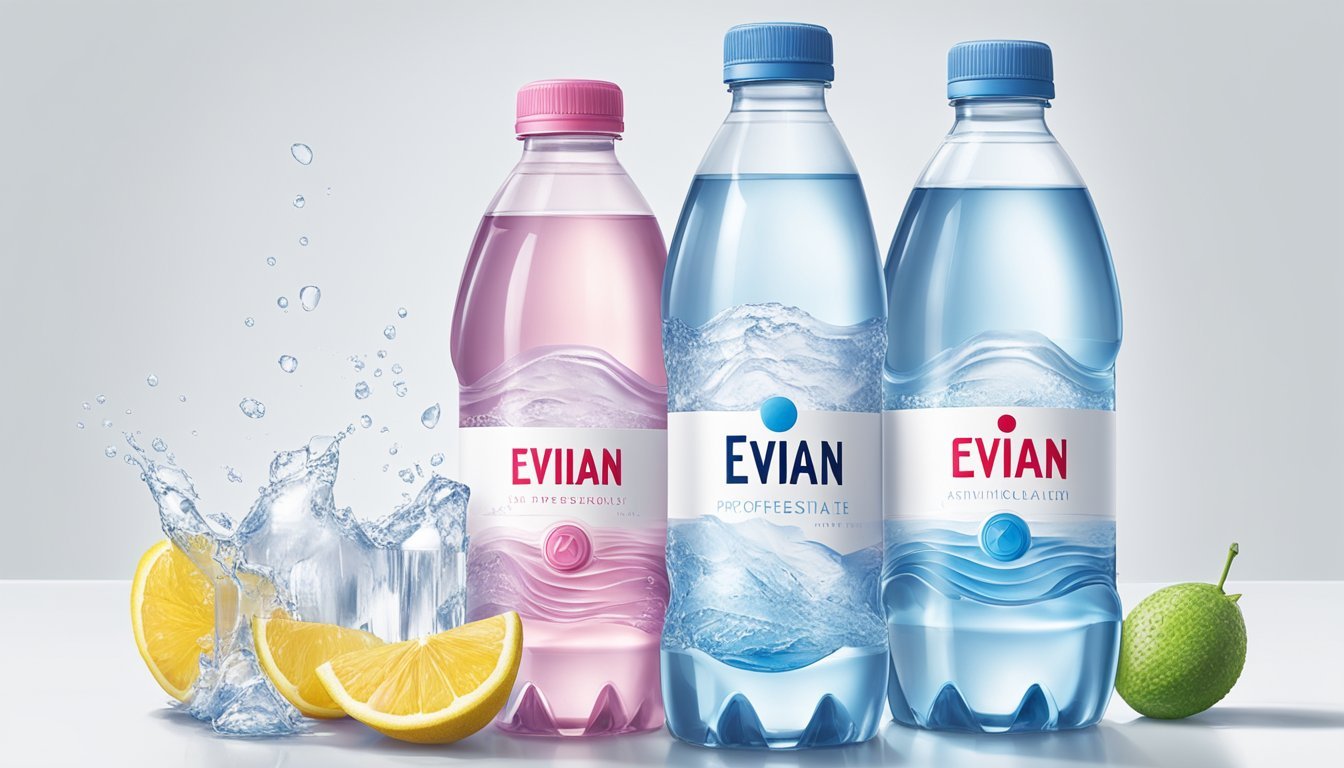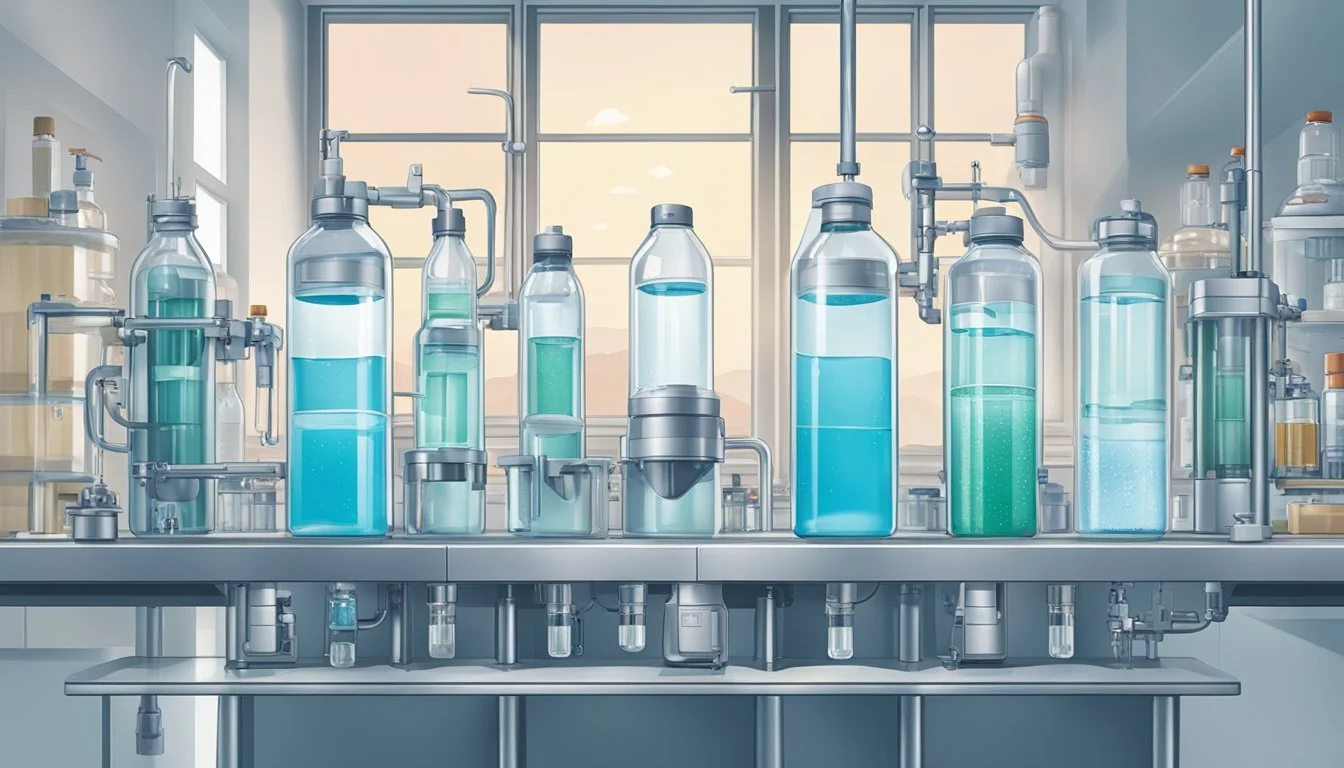Evian vs. 1907water
Which Bottled Water is Better for You?
When it comes to selecting a bottled water brand, both Evian and 1907water offer unique benefits that can cater to various preferences. Evian, sourced from the French Alps, is known for its natural purity and balanced mineral content. This results in a smooth and refreshing taste that has garnered a loyal following worldwide.
In contrast, 1907water is an emerging player in the bottled water market, sourced from the pristine artesian aquifers of New Zealand. It boasts a naturally high pH level, which some consumers believe enhances hydration and offers additional health benefits. The brand emphasizes sustainability, aiming to deliver premium water while minimizing environmental impact.
For those prioritizing mineral content and a classic taste, Evian stands out as the preferred choice. Meanwhile, consumers looking for alkaline water with a commitment to eco-friendly practices may find 1907water more appealing. The direct competition between these two brands reveals the diversity and innovation present in today’s bottled water industry.
Understanding Bottled Water
Bottled water differs widely due to varying sources and types, offering unique characteristics and benefits to consumers. Major factors include the origin of the water and the specific processes it undergoes.
Origin and Source
The origin of bottled water affects its taste and mineral content. Sources can be natural springs, underground aquifers, or public taps. Water from the French Alps, such as Evian, is naturally filtered, enhancing its purity and taste. In contrast, 1907water is sourced from an artesian aquifer in New Zealand, reputed for its pristine quality.
Natural sources often influence the water's composition. For example, spring waters contain naturally occurring minerals. Artesian water, like 1907water, is stored in underground layers of rock, providing a unique mineral profile.
Types of Bottled Water
Spring Water: This type comes from underground sources where water flows naturally to the surface. It retains minerals naturally found in the location.
Mineral Water: Contains a higher concentration of dissolved minerals and must be sourced from a mineral spring.
Artesian Water: Sourced from a confined aquifer under pressure. Examples include 1907water.
Purified Water: Often derived from municipal sources but undergoes purification processes like distillation or reverse osmosis to remove contaminants.
Sparkling Water: Infused with carbon dioxide gas, it can also be spring or mineral water.
Understanding these types can help consumers choose the right product based on their preferences and needs.
Bottled Water Brands Overview
Prominent brands vary in quality, source, and type. Evian, from the French Alps, is praised for its balanced mineral content. 1907water offers premium artesian water from New Zealand.
Brands like Nestle Pure Life, Aquafina, and Dasani provide purified water, often sourced from municipal taps before undergoing extensive filtration. Other notable brands include Fiji, with its tropical source, and Smartwater, which offers vapor-distilled water with added electrolytes.
Voss stands out for its sleek packaging and pure artesian source. Each brand brings distinct attributes, influencing consumer choice based on taste, source, and perceived health benefits.
Water Quality and Composition
When comparing Evian and 1907water, it’s essential to examine water quality and composition. Key aspects include pH levels, mineral content, and the health impact of these minerals.
pH Levels
Evian water typically has a pH of 7.2, which is slightly alkaline. Being slightly above neutral, it is easy on the stomach and suitable for regular consumption.
1907water from New Zealand often boasts a higher pH level, around 8.0. This categorizes it as alkaline water, which some claim can help neutralize body acidity and improve hydration efficiency. Both options provide a smooth drinking experience without a pronounced aftertaste.
Mineral Content Analysis
Evian is known for its balanced mineral profile, reflecting the natural filtration process through the French Alps. It includes calcium (80 mg/L), magnesium (26 mg/L), and bicarbonates (357 mg/L). These contribute to its unique taste.
1907water also emphasizes its mineral composition from deep aquifers. It highlights potassium (1 mg/L) and sodium (5 mg/L) along with calcium and magnesium. While specific concentrations vary, the mineral levels contribute to a clean taste and are beneficial for hydration.
Health Impact of Minerals
The minerals in both Evian and 1907water offer several health benefits. Calcium supports bone health, while magnesium is vital for muscle function and enzymatic reactions. Bicarbonates in Evian help maintain pH balance in the body, promoting digestive health.
1907water’s alkaline nature, with its specific mineral blend, can support electrolyte balance and hydration after exercise. Consuming water rich in minerals, like sodium and potassium, can aid in replenishing lost electrolytes during rigorous activities.
In summary, both waters provide a beneficial mix of minerals supporting general health and hydration, making them well-suited for daily consumption.
Taste Profile Assessment
The taste of water can be subtly influenced by various factors ranging from mineral content to the bottling process. Detailed blind taste tests offer an objective comparison to determine consumer preferences between Evian and 1907water.
Factors Influencing Water Taste
Mineral Content:
The mineral composition notably affects taste. Evian, sourced from the French Alps, contains higher levels of calcium and magnesium, contributing to a slightly higher pH level of 7.07. This alkalinity gives Evian its distinctive, smooth mouthfeel.
Water Source:
Evian and 1907water are sourced from pristine locations. Evian comes from glacial springs, while 1907water originates from the aquifers of New Zealand. These sources contribute to their unique properties.
Bottling and Packaging:
The presence of other substances can influence the water’s flavor. Bottling materials and processes must ensure that no external elements alter the taste, keeping the experience as clear and refreshing as possible.
Blind Taste Tests
Objective Comparison:
Blind taste tests eliminate bias by ensuring participants are unaware of the brands they are consuming. Such tests are crucial in providing honest feedback on the taste profile of Evian and 1907water.
Findings:
Participants often note a refreshing flavor from both brands, but some prefer Evian's smoother, more balanced taste due to its mineral content. 1907water, relatively neutral with a pH close to 7.0, is often praised for its crisp and clean finish.
Preferences:
These tests highlight individual taste preferences, with some consumers favoring the slightly alkaline, mineral-rich profile of Evian, while others prefer the pure, unaltered taste of 1907water. Consumer feedback from these tests provides valuable insights into the nuances that differentiate these brands.
Environmental and Sustainability Considerations
When comparing Evian and 1907water, understanding their environmental impact and sustainability practices is essential. Each brand's approach to bottling and ecological footprint plays a significant role in their overall environmental impact.
Bottling Process and Material
Evian primarily uses plastic bottles, which are recyclable but still contribute to overall plastic waste. Plastic production and disposal have a significant impact on the environment. Evian has made efforts to use recycled plastic in its bottles, aiming for a circular economy where resources are reused.
In contrast, 1907water offers its product in both glass and boxed water formats. Glass bottles are more environmentally friendly because they are reusable and recyclable, significantly reducing waste. Boxed water, made from predominantly renewable materials, presents another sustainable option. These alternatives to plastic help diminish the brand's overall environmental impact.
Ecological Footprint
Evian sources its water from the French Alps, focusing on natural water source management. The brand invests in protecting this environment to maintain long-term sustainability. Their initiatives include conservation efforts and ecosystem protection, which are crucial for maintaining water quality and availability.
1907water sources its water from New Zealand, emphasizing minimal ecological impact. By offering shipping solutions that reduce carbon footprint, the brand addresses transportation-related emissions. Additionally, the use of glass and boxed water reduces reliance on plastic, further supporting an eco-friendly approach.
These considerations highlight the environmental and sustainability aspects of Evian and 1907water, providing insight into their impact on our world.
Comparison Between Evian and 1907water
Evian and 1907water differ significantly in their nutritional value, taste, and environmental impact. This section will explore these factors to assist readers in making an informed choice.
Nutritional Value and Mineralization
Both Evian and 1907water offer distinct mineral compositions. Evian water contains 24 mg/L of Magnesium, 78 mg/L of Calcium, and a significant bicarbonate content. This profile provides a balanced mineral composition known for potential health benefits, such as aiding digestion and maintaining hydration.
1907water, sourced from New Zealand, presents a unique mineral blend that includes Silica, known for promoting skin health and hair growth. Its lower mineral content makes it ideal for individuals seeking a lighter mineralized water. Each brand caters to different nutritional needs based on their mineralization profiles.
Taste and Flavor
Evian is often recognized for its smooth, subtle flavor. The high bicarbonate content contributes to a crisp taste that many consumers find refreshing. Its flavor profile is consistent, making it a reliable choice for those who prefer a clean and mildly mineralized taste.
1907water is praised for its soft, silky texture, attributed to its lower overall mineral content and higher Silica levels. Its pure, light flavor makes it a favorite among those who dislike heavily mineralized waters. The taste difference between these two brands often boils down to personal preference regarding mineral content and overall mouthfeel.
Sourcing and Eco-friendliness
Evian's source is the French Alps, specifically from the Cachat Spring. The brand emphasizes sustainable practices, including carbon-efficient bottling processes and the use of recycled materials in their packaging. They have committed to using 100% recycled PET plastic by 2025.
1907water is sourced from an artesian aquifer in New Zealand, ensuring purity and a natural filtration process. The brand promotes eco-friendly practices, including minimalistic packaging and efforts to reduce carbon footprint during transportation. Their water is bottled at the source, maintaining natural freshness and quality.
By considering the distinct differences in mineral content, taste preferences, and environmental practices, consumers can choose the bottled water that best fits their lifestyle and values.
Production and Filtration Technologies
Evian and 1907water utilize different production and filtration technologies to deliver high-quality bottled water. This section details their advanced filtration processes, the presence of natural versus added minerals, and how they handle safety and purity to maintain high standards.
Advanced Filtration Processes
Evian relies on a natural filtration method, where water flows through layers of glacial sand in the French Alps for over 15 years. This process naturally filters out contaminants and adds beneficial minerals without human intervention.
1907water employs advanced filtration techniques including reverse osmosis. This system uses a semipermeable membrane to remove impurities, ensuring the water is pure and clean. This method is known for its ability to eliminate a high percentage of contaminants, resulting in superior hydration.
Their differing approaches highlight the distinctive qualities in filtration technology, each providing a unique aspect to consumer preference.
Natural vs. Added Minerals
Evian contains natural minerals like calcium, magnesium, and bicarbonates, which it naturally acquires during its long journey through the Alps. These minerals are essential for various bodily functions and contribute to Evian's unique taste.
1907water also contains a blend of minerals, though its techniques might involve adding minerals post-filtration to achieve a specific taste profile and maintain essential health benefits. The use of added minerals can enhance water quality, ensuring that it meets the nutritional needs of consumers.
Consumers may appreciate Evian for its purely natural mineral content, while 1907water's approach allows for precise control over the mineral profile.
Safety and Purity
Ensuring safety and purity is crucial for both Evian and 1907water. Evian's natural filtration over high-quality glacial sands guarantees low contaminant levels, aligning with EPA and FDA standards. Routine testing further ensures compliance with health regulations.
1907water uses reverse osmosis and other advanced filtration technologies to achieve high purity. This process removes particulates, chemicals, and biological contaminants, adhering to both EPA and FDA guidelines.
Both brands focus heavily on safety protocols, employing rigorous testing to ensure their water remains free of harmful substances and suitable for consumption. Their commitment to maintaining purity helps build consumer trust and ensures they deliver safe, high-quality hydration.
Consumer Information and Market Trends
Evian and 1907water are popular bottled water brands with distinct market positions. Key considerations include price, brand reputation, and availability.
Price Comparison
Evaluating the cost of bottled water options, Evian and 1907water exhibit varied pricing strategies. Evian, sourced from French Alps springs, generally falls in the higher price bracket due to its international reputation and marketing efforts. Conversely, 1907water, sourced from the New Zealand alps, also commands a premium but is often priced slightly lower than Evian.
In retail, a 1-liter bottle of Evian typically costs around $2.50 to $3.00, while 1907water usually ranges from $2.00 to $2.70. Bulk purchases or wholesale prices may offer slight reductions, appealing to cost-conscious consumers.
Brand Reputation and Public Perception
Evian is part of Nestle's portfolio and has a longstanding reputation for purity and luxury. It leverages its heritage and association with high-profile events for brand positioning. Public perception generally aligns Evian with premium quality, bolstered by rigorous marketing campaigns.
1907water, although a newer entrant, is gaining recognition for its eco-friendly practices and high pH level. Consumers appreciate its commitment to sustainable sourcing and packaging. The brand actively cultivates a boutique image, which resonates with environmentally conscious buyers.
Both brands enjoy significant trust, but Evian often garners broader recognition due to its established history.
Market Availability
Evian boasts extensive market presence, available in supermarkets, convenience stores, and online platforms globally. Its distribution networks are robust, ensuring easy accessibility for consumers in various regions.
1907water is progressively expanding its market foothold. Initially popular in Oceania, it is now making strides in North American and European markets. Availability might be more limited compared to Evian, but its strategic presence in specialty stores and online channels helps bridge the gap.
Consumer preferences influence market trends heavily; while Evian commands a lead in availability, 1907water is notable for targeting niche segments effectively.
Conclusion
When comparing Evian and 1907water, several factors come into play.
Evian is renowned for its high calcium and magnesium content, which may appeal to those seeking mineral-rich hydration. It also prides itself on sustainability, with bottles made from 100% recycled PET plastic and plans for a carbon-neutral production site by 2024. This eco-friendly approach can be a significant deciding factor.
1907water offers unique appeal with its high alkalinity, sourced from New Zealand’s artesian aquifers. This can be an attractive option for consumers looking for naturally alkaline water with the purported benefits of neutralizing acidity in the body. The brand emphasizes purity and maintaining natural balance.
Final Thoughts
Both brands bring distinct advantages to the table. Evian excels in mineral content and sustainability initiatives. 1907water stands out for its natural alkalinity and purity.
Recommendation
Choosing between Evian and 1907water largely depends on individual preferences. If mineral content and sustainability are priorities, Evian may be the better choice. For those attracted to alkaline water and unique sourcing, 1907water might be more appealing.
More About Evian
Evian vs Mountain Valley Spring Water: Which Bottled Water is Better?
Evian vs Richard's Rainwater: Which Bottled Water is Better?
Evian vs Whole Foods Italian Still Mineral water: Which Bottled Water is Better?
More About 1907water
1907water vs Kirkland Signature: Which Bottled Water is Better?
Cascade Mountain vs 1907water: Which Bottled Water is Better?
Hawaii Volcanic vs 1907water: Which Bottled Water is Better?
Hawaiian Springs vs 1907water: Which Bottled Water is Better?
Icelandic Glacial vs 1907water: Which Bottled Water is Better?
Mountain Valley Spring Water vs 1907water: Which Bottled Water is Better?
Nestle Pure Life vs 1907water: Which Bottled Water is Better?
Richard's Rainwater vs 1907water: Which Bottled Water is Better?
Solan de Cabras vs 1907water: Which Bottled Water is Better?
Talking Rain AQA vs 1907water: Which Bottled Water is Better?
Whole Foods 365 vs 1907water: Which Bottled Water is Better?
Whole Foods Italian Still Mineral water vs 1907water: Which Bottled Water is Better?









